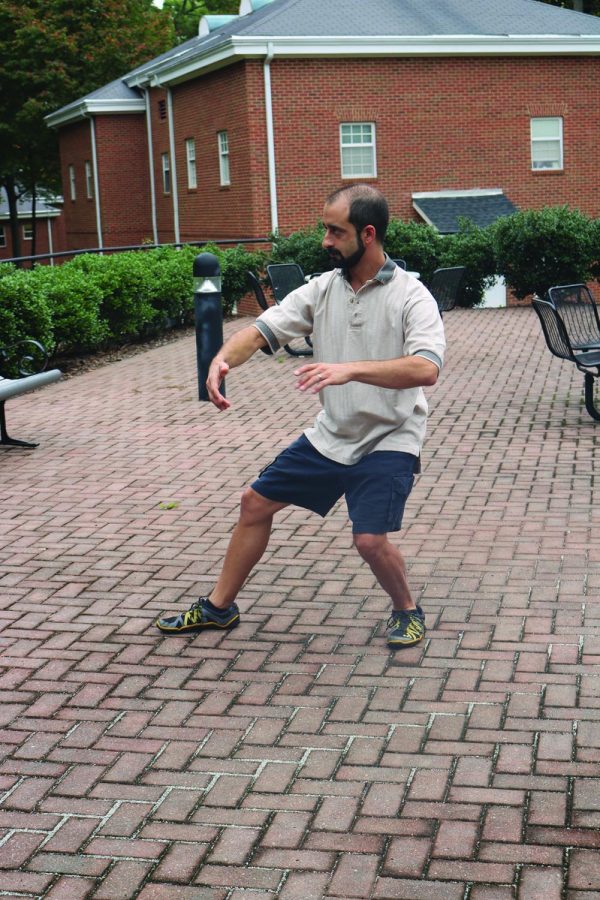Pete Sangimino teaches Tai Chi at Guilford
Pete Sangimino, professor of Tai Chi, poses in a Tai Chi stance. Sangimino is a new, part-time instructor in the sports studies department.// Photo by Abigail Bekele/The Guilfordian
This year, Guilford College welcomed new faculty member Pete Sangimino, who is filling in as a part-time Tai Chi instructor for Michelle Carter. Tai Chi is known for its health benefits and helps maintain strength and flexibility. It is a form of meditation which helps with stress and promotes serenity. This is Sangimino’s first semester teaching at Guilford College and so far, he is liking the vibe and how our community meets everyone’s needs. The Guilfordian sat down with Sangimino to learn more about him.
Q: What drew you to Guilford?
A: Michelle Carter asked me (to teach) since she moved farther from Guilford. I teach half her classes, but I also teach Tai Chi at the University of North Carolina at Greensboro. Also, we had an instructor from (UNCG)teaching at Guilford for some time now.
Q: Why did you choose your field of study? What’s the coolest thing about it?
A: The reason why I study, practice and teach Tai Chi (is) because it’s beneficial. I feel better when I practice and teach it. The benefits of Tai Chi have a healing quality and (it) teaches you to use your body in the correct way. It is applicable to other things such as music and sports, but overall it can be useful to college students. College students tend to be under a lot more stress and must perform.
Q: What is the best part of teaching? And the worst?
A: It gives me a deep satisfaction sharing something that people benefit from. Not so much in these classes but when you have a mix of abilities, interest, and commitment level it can be difficult to address everyone’s needs. College is easier due to more cohesive levels.
Q: If you weren’t a professor, what would you do?
A: I have a day job. I am a marketing manager and I do digital design, like web design.
Q: What academic accomplishment are you most proud of as a professor and/or student?
A: My highest academic degree is a bachelor’s degree. In terms of teaching what I teach people they take it with them. It has made a huge difference in lives, so in my perspective has been my greatest accomplishment.
Q: Tell me about a time you failed at something and what you learned.
A: It’s funny when people ask you that. I was the marketing director of a telecom company, and I was pretty good at what I did. Here I was employed by these new people and a lot of management was promoting me. The person in management was hiring family, and it backfired because others considered me up there because they felt threatened. Eventually there were layoffs and I was in the numbers. A lesson I learned was letting my ego drive my ambition.
Q: Tell me about something you wish you knew as an undergraduate that you’d share with today’s college students.
A: I don’t think this is the right advice for everyone. I was one of those types of students who could not tolerate a B, but not every student is like that. The night before college graduation I was thinking I did not regret studying like I did. After college, my friends went straight into their careers, but in the long run I had to get things out of my system. I needed a healthy influence in my life post college.
Q: How do you start your day?
A: I start my day by getting my kid to school. My wife does the same, but it is a shared effort.
Q: How do you finish your day?
A: I come home and jog a couple of miles with the dog.
Q: What’s the last book you read for fun? And why?
A: I encourage people to read the book, “The Righteous Mind” by Jonathan Haidt. The sub title is why good people disagree on religion and politics. Trying to understand what is going on in our world is the basis. It is not an easy read but a great book.









